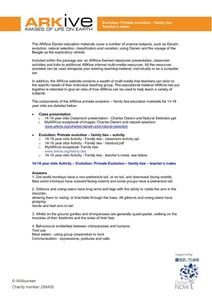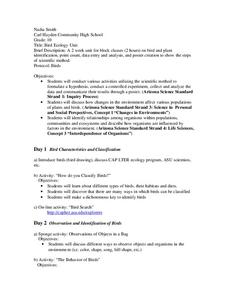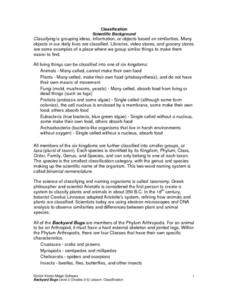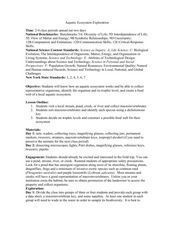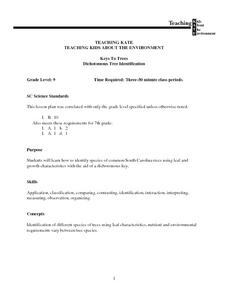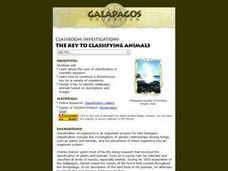Curated OER
Water in the Biosphere
Environmental explorers examine the campus and take note of living organisms. Introduce them to the biosphere and the questions of the day: How much water can be found in the biosphere? A slide show helps you along, and even contains a...
Curated OER
Create a Dichotomous Key of Idaho Reptiles
Learners use the reptile section of the Digital Atlas of Idaho. They make a dichotomous key and decide on what defining characteristics they can use to distinguish between species. They hone their observation skills and recognize...
Curated OER
Paleoecology Using "Fossilized" Owl Pellets
Students study the differences in anatomy to help identify different species and use a dichotomous key to identify what the owls were eating. In this investigative lesson students dissect owl pellets to identify the species eaten and...
South Gloucestershire Council
Animal Classification: A Collaborative Sorting Activity for Key Stages 2 & 3
Introduce the logic behind a dichotomous key or administer a group performance assessment with a fun and challenging classification lesson. With explicit instructions for the teacher and for collaborative groups, as well as engaging...
Curated OER
Fun with Fictitious Animals
How can one differentiate between a dweezlebub and nessie? Use this fictitious creature dichotomous key to find out! Biologists of all ages will enjoy this creative way to learn about classification, including a chance to draw the...
Curated OER
Exploration of "Pillbugs"
Fifth graders define vocabulary terms, identify the characteristics of a pillbug, and create a dichotomous key. Then they examine the pillbugs and make observations and record these observations. Finally, 5th graders observe specific...
ARKive
Primate Evolution- Family Ties
If humans evolved from apes, why are there still apes? Using captivating pictures and videos of our primate cousins, young biologists examine evidence to dispel one of the most common misconceptions about human evolution. Depending on...
Curated OER
A Tree-mendous Project
Seventh graders use their observation and measurement skills to identify trees. Using a tree diagram, they label the parts and discuss the functions of the tree. They practice using a dichotomous key to identify trees as well.
Curated OER
Jewel of the Earth
Students investigate several organisms, set sticky traps to collect them, and attempt to identify and classify them using a variety of sources. The origins of the organisms are traced and their adaptive features examined.
Curated OER
An Introduction to Dichotomous Keys
Young scholars pretend to be shark biologists employed by the National Oceanic and Atmospheric Administration (NOAA) who have been flown into the coastal city of Sao Luis in Brazil because locals have noticed an unidentified shark at...
Curated OER
Using a Dichotomous Key for Invertebrate Phyla
Middle schoolers use a key to determine the phyla of invertebrates. They are broken into groups and each group gets a stack of pictures and uses the key to determine which phyla the animal belongs to. There are also individual...
Curated OER
Dichotomous Key: Minerals
For this earth science worksheet, students identify various minerals as described in the fifteen questions. They identify the luster and hardness of a mineral. Then, students identify what color the mineral is and whether it has streaks...
Cornell University
Classification
Explore the scientific method of classification. An interactive activity asks learners to create a classification system for a group of objects and develop a flow chart to communicate their systems. In addition, individuals use a...
Chicago Botanic Garden
Impacts of Climate on Forest Succession
Part two in a series of four explores the effects of climate on succession or the changing of plant species in a forest. Groups review how to identify trees and then spend a day in the field collecting extensive data on trees to...
Curated OER
Bird Ecology Unit
Tenth graders conduct various activities utilizing the scientific method to formulate a hypothesis, conduct a controlled experiment, collect and analyze the data and communicate their results through a poster. They also identify...
Curated OER
Backyard Bugs
Explore the concept of scientific classification and the similarities and differences between plant and animal species. Your class will participate in hands-on activities by investigating dichotomous keys and classifying their shoes. To...
Curated OER
Aquatic Ecosystem Exploration
Learners visit a local stream, pond, creek, or river and collect macroinvertebrates. They sort macroinvertebrates and identify each species using a dichotomous key. Students decide on trophic levels and construct a possible food web for...
Curated OER
Classify Machines that Fly!
Eighth graders explore flight and the dichotomous key. In this flight lesson, 8th graders gain understanding of the dichotomous key and create one of their own. Students then use their dichotomous key to classify types of aircraft.
Curated OER
Keys To Trees: Dichotomous Tree Identification
Ninth graders gather samples of different tree leaves in their neighborhoods, and on school grounds, and identify several species of common South Carolina trees using leaf and growth characteristics with aid of dichotomous key.
Curated OER
The Key To Classifying Animals
Explorers of the environment construct a dichotomous key for a variety of organisms and design a key to classify Galapagos animals based on descriptions and images. The lesson plan includes a link to an animal gallery and the worksheet...
Curated OER
Classifying Rocks
Fifth graders examine and participate in the process of classifying rocks. In small groups, they sort the rocks into two categories and complete a Venn diagram. Next, they select three rocks, and complete a worksheet that is in the...
Curated OER
Classifying Organisms within Kingdoms
Students examine animal kingdom classifications. They discuss how animals are placed into kingdom classifications and compare similarities and differences of animals within a kingdom.
Purdue University
Trees of the Midwest
All trees are not created equal. A set of three wildlife conservation lessons has learners examine the characteristics of individual trees. They look at the life cycle of the tree using a story and reference a field guide to identify...
CPO Science
Science Worksheets
If you need an array of worksheets to augment your science lessons, peruse a collection of assignments that is sure to fit your needs. With topics such as metric conversion, the scientific method, textbook features, research skills,...
Other popular searches
- Rock Dichotomous Keys
- Mineral Dichotomous Keys
- Cladogram Dichotomous Keys
- Dichotomous Keys for Trees
- Making a Dichotomous Keys
- Dichotomous Keys Fossils
- Cells Dichotomous Keys
- Cardiogram Dichotomous Keys
- Water Dichotomous Keys
- Dichotomous Keys for Unknows
- Barnacles Dichotomous Keys
- Dichotomous Keys for Unknowns








